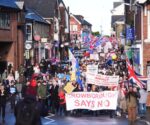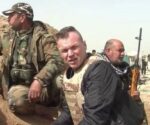Secretary Rubio: We’ve Made Significant Progress In Talks With Ukraine
Secretary of State Marco Rubio provided an update on the Ukraine peace talks in Geneva, Switzerland, saying that “it was probably the most productive day we have had on this issue, maybe in the entirety of our engagement, but certainly in a very long time.” “I’m not going to get into the details on the issues. This is a very delicate moment and it’s important,” he said. “The items that remain open are not insurmountable. We just need more time than what we had today. I honestly believe we’ll get there.”
SECRETARY OF STATE MARCO RUBIO: I think we’ve made a tremendous amount of progress, even from the last time I spoke to you. And I apologize for keeping you waiting, but there was more work to be done. You know, we began almost three weeks ago with a foundational document that we socialized and ran by both sides, and with input from both sides. And one of the things that happens when you’ve been involved in this now for ten months is you get a pretty good sense of what the priorities and the red lines and the important issues are for both sides. And so that allowed us to create a foundational document, which has been an ongoing working document. In fact, over the last 96 hours or more, there’s been extensive engagement with the Ukrainian side, including our Secretary of the Army and others being on the ground in Kyiv, meeting with relevant stakeholders across the Ukrainian political spectrum, in the legislative branch and the executive branch and the military and others, to further sort of narrow these points. We arrived here today with one goal, and the goal was to take, you know, 28 points or 26 points, depending on which version as it continues to evolve, and try to narrow the ones that were open items. And we have achieved that today in a very substantial way. Now, obviously, like any final agreement, they’ll have to be agreed upon by the presidents, and there are a couple issues that we need to continue to work on. But I think the report today is that I think today was worthwhile. It was very, very-pretty, it is probably the most productive day we have had on this issue, maybe in the entirety of our engagement, but certainly in a very long time. But work remains. And because this continues to be a working process, you know, I don’t want to declare victory or finality here. There’s still some work to be done, but we are much further ahead today at this time than we were when we began this morning, and where we were a week ago for certain. REPORTER: Has Ukraine… a couple of issues? Yes, we may. Will you please specify on that? MARCO RUBIO: Well, I’m not going to get into the details on the issues. This is a very delicate moment and it’s important. Like I said, there’s not agreement on those yet. Some of it is semantics or language. Others require higher-level decisions and consultation. Others, I think, just need more time to work through. As an aside, I will mention that there were items that we were discussing as part of the original 28, or as it evolved. This is a work and this is a living, breathing document. Every day, with input, it changes. There are some that involved equities or the role of the EU or of NATO or so forth, and those are kind of segregated out because we just met with the national security advisers for various European countries, and those are things we’ll have to discuss with them because it involves them. So we sort of really focused on the ones that were bilateral in nature for the most part. So there are a couple-none of it insurmountable. I can tell you that the items that remain open are not insurmountable. We just need more time than what we had today. I honestly believe we’ll get there. REPORTER: Has Ukraine indicated to you it respects compromise, for instance, some of those key issues like territory in exchange for peace? Suggested that they are… MARCO RUBIO: Well, I’m not going to-look, it’s not because, for purposes of evasion, it’s just that I’m not going to get into the details of the topics that were discussed, because this is an ongoing process. What is important to understand in how these things work is you have to-in order to have a proposal, you have to write it. You know, if it’s just verbal, it’s in the air. You have to put it down on a piece of paper. And just because it’s printed on a piece of paper doesn’t indicate finality. So you get input, and based on that input, you make adjustments, and then you get more input, or you make a counteroffer, and you get more adjustments. That’s an ongoing process. There’s a lot more of that to happen. So I’m not going to speculate or go into the details of any of the specific items in the latest version of the proposal, because frankly, by tomorrow or the next day that may have evolved and changed further. But I can tell you, I feel very optimistic that we can get something done here, because we made a tremendous amount of progress. Today was very positive. I’m telling you, today was the most productive day we’ve had. I’m grateful that-well, today, and we’ve talked to him since. I think he’s quite pleased at the reports we’ve given him about the amount of progress that’s been made so far. Well, obviously the Russians get a vote here, right? So, I mean, look, we began from the early stage of this process with our understanding of the Russian position, as had been communicated to us in numerous ways. You know, at the State Department we received numerous written non-papers and things of this nature. Also verbally, things they’ve discussed over time and so forth. So no matter what we came up with today, obviously we now have to take what we come up with-if we can reach that agreement with the Ukrainian side-to the Russian side. That’s another part of this equation. You know, they have to agree to this in order for this to work. REPORTER: But the deadline is…? MARCO RUBIO: We want to get this done as soon as possible. Obviously, you know, we would love it to be Thursday. We’d love to meet. Ultimately, the important point today is that we have made substantial progress. We have really moved forward. So I feel very optimistic that we’re going to get there in a very reasonable period of time, very soon. You know, whether it’s Thursday, whether it’s Friday, whether it’s Wednesday, whether it’s Monday or the following week, we want it to be soon because between today and the time we deal with this, more people are going to die, more destruction is going to happen. Our goal is to end this war as soon as possible, but we need a little more time. I’m not going to discuss any of the particulars of it. Frankly, as I said, it is an ongoing process. And so I think there’s work to be done. I know that’s deeply unsatisfying to you who have to cover these sorts of things, but I wanted to make you aware that we’ve made progress. I simply don’t want to do anything that sets us back in that regard. But I can tell you we’ve made substantial progress. Today was the best day we have had in our entire ten months of working on these issues. REPORTER: And if you go to the chairman of the European representative today…? MARCO RUBIO: Yes. Yeah, we met with the national security advisors of a variety of countries that were here, and we sort of walked them through the progress we have made today. We didn’t go into tremendous detail. We assured them that items that involved both Europe and NATO directly, those are items that we sort of agreed to put as part of a separate track because it involves input from them. But I think what they heard, and I hope they’ll confirm-I believe they will-is an incredible amount of positivity from both the Ukrainian and American side about the progress we’ve made today. REPORTER: And tomorrow? What’s the plan for tomorrow? Some say it only makes sense if it includes a provision that says the Americans are willing to provide the security guarantees similar to Article 5 of NATO. Are you receptive to this? MARCO RUBIO: Again, I’m not going to discuss the details of what’s being worked on with regards to particular provisions. I mean, clearly, I think we all recognize that part of getting a final end to this war will require, for Ukraine, to feel as if it is safe and it is never going to be invaded or attacked again. So that’s clearly something that has to be discussed. I think we’ve made substantial progress on that and other points, but I’m not going to get into the details today. If you have time for two more, guys, because I’ve got to read some more-some more from the Russians for the next two hours… REPORTER: What would that be? A couple of days with President Trump and Zelensky? MARCO RUBIO: I don’t know, it’s possible. I’m not sure. What happens tomorrow? We keep working. I mean, look at this process here. This process has been ongoing now for the better part of three weeks, and it’s really sped up in the last 96 hours. So we have all kinds of people at technical levels that are working full time on this and engaged in this full time. In fact, even as we got up and broke up now and walked away from the table, there are a handful of technical items that we expect answers from them on, or suggestions from them on, in the next 24 hours or so. So this is an ongoing process. We don’t have to be here in this building for that to move. But we thought today, being here in person, allowed us to make great strides, especially since they sent such a high-level delegation who have the authority to sort of call back to their capital, talk to their president and agree to certain things. So we’ve made a lot of progress. We’ve got some of the concept proposals on the European plan under control. I’m not aware of a counterplan and I haven’t seen any counterplan. All right, guys, thank you.









